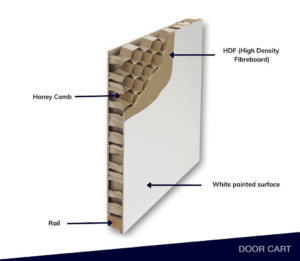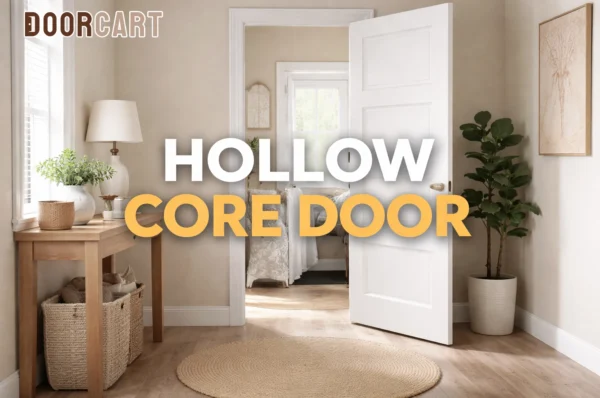When it comes to selecting doors for your home, the choices can be overwhelming. Two common options that often spark debate are solid core doors and hollow core doors. Both have their unique characteristics and serve different purposes. In this blog, we will delve into the distinctions between solid core doors and hollow core doors to help you make an informed decision for your specific needs.
Let’s discuss Solid Core Doors first.
Solid core doors are constructed with a solid, dense material at their core, usually made of engineered wood or a composite material. This type of construction gives solid core doors a heftier feel and greater durability compared to their hollow counterparts. The solid composition also provides better sound insulation and a more substantial overall feel.

Features of Solid Core Doors:
-
Weight and Feel: Solid core doors are heavier than hollow core doors, providing a sturdier and more substantial feel when opened or closed.
-
Sound Insulation: The dense core material of solid doors naturally offers better sound insulation, making them a preferred choice for areas where noise reduction is important. Solid core doors help to reduce the transmission of sound from room to room, creating a quieter and more comfortable living or working environment.
-
Durability: Solid core doors are generally more durable and resistant to wear and tear, making them suitable for high-traffic areas.
-
Cost: Solid core doors are typically more expensive than hollow core doors due to the higher quality materials used in their construction.
About Hollow Core Doors.
As the name suggests, it has a hollow space at its core. This space is often filled with a cardboard honeycomb or a grid of wooden supports. While lighter in weight, hollow core doors are still a popular choice for various applications.
Features of of Hollow Core Doors:

-
Lightweight & Affordability: Hollow core doors are significantly lighter than solid core doors, making them easier to handle and install. Hollow core doors are generally more budget-friendly than solid core doors, making them a cost-effective option for interior doors in residential settings.
-
Versatility: Due to their lighter weight, hollow core doors are suitable for a variety of uses, especially where sound insulation and durability are not primary concerns.
-
Temperature Stability: Hollow core doors may offer better temperature stability, as they are less prone to warping than solid doors in certain environmental conditions.
Choosing between solid and hollow core doors depends on your specific needs, budget, and the intended application. Solid core doors are ideal for areas where durability and sound insulation are crucial, while hollow core doors offer a cost-effective solution for less demanding environments.
WHICH SOLID CORE DOOR IS RIGHT FOR YOU?
Our range of white primed internal doors offers a stylish, elegant finish to your home, whatever your style or scheme.
Learn more about our solid door range and where to buy.




